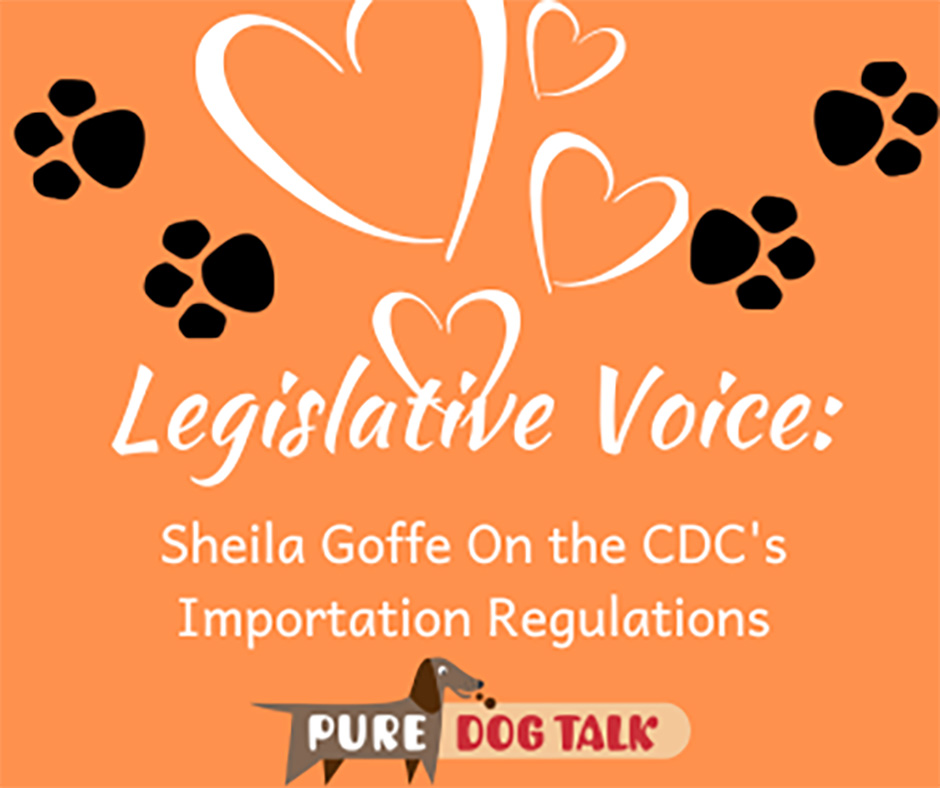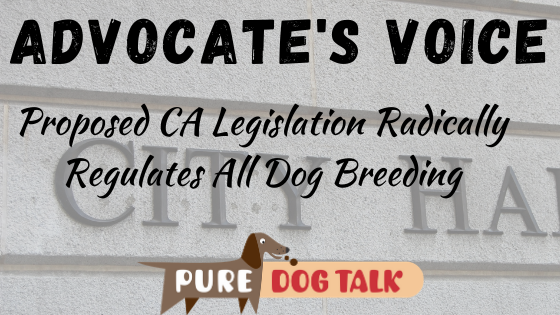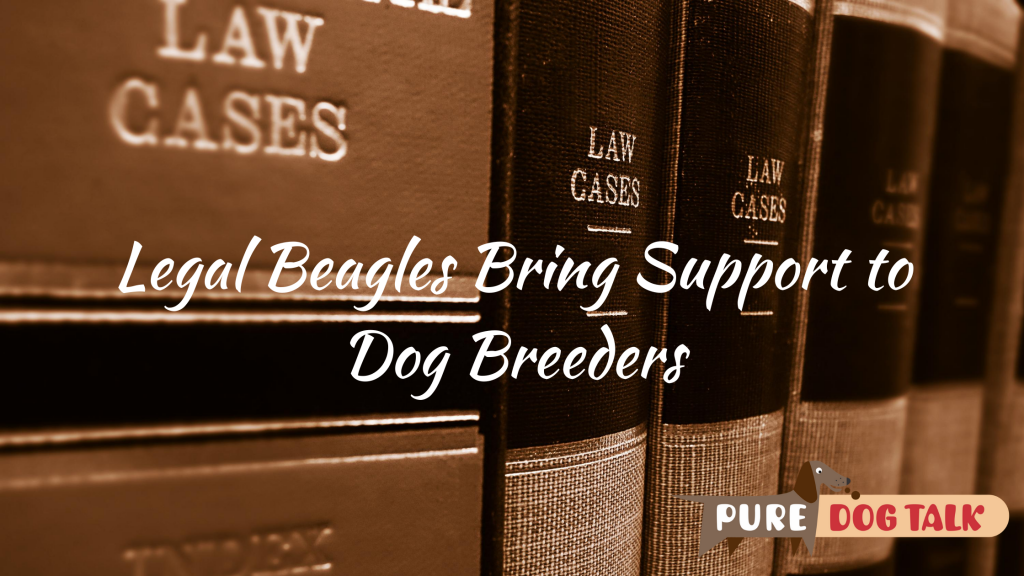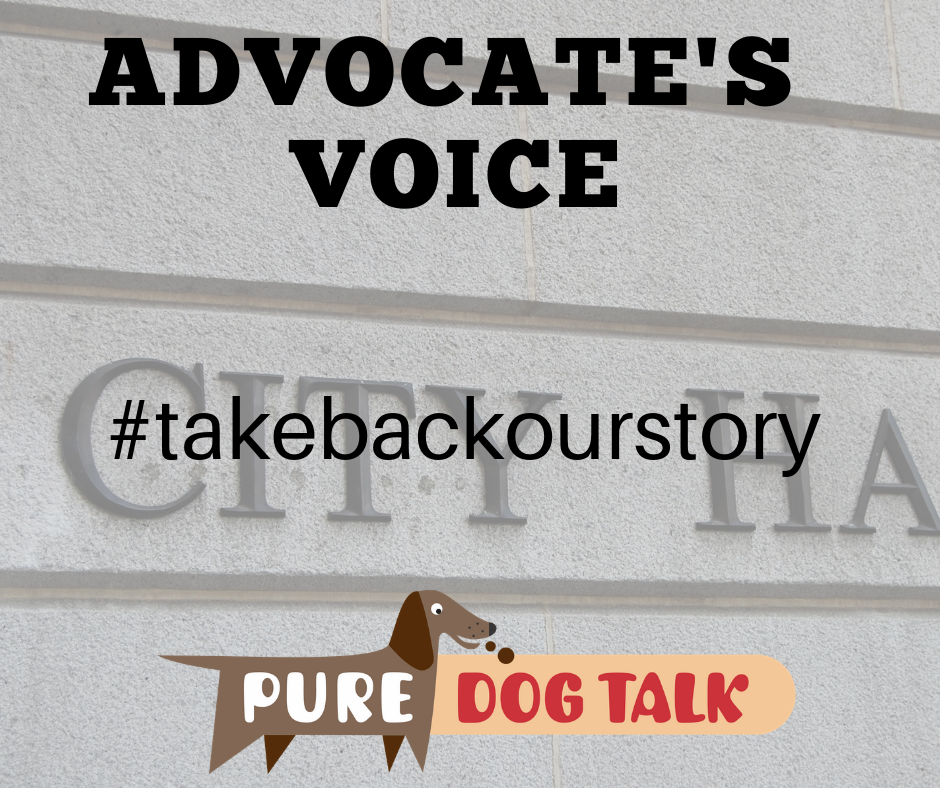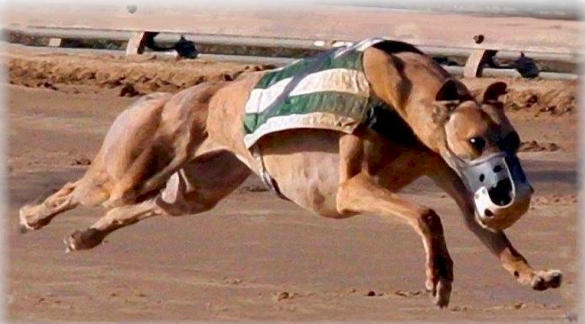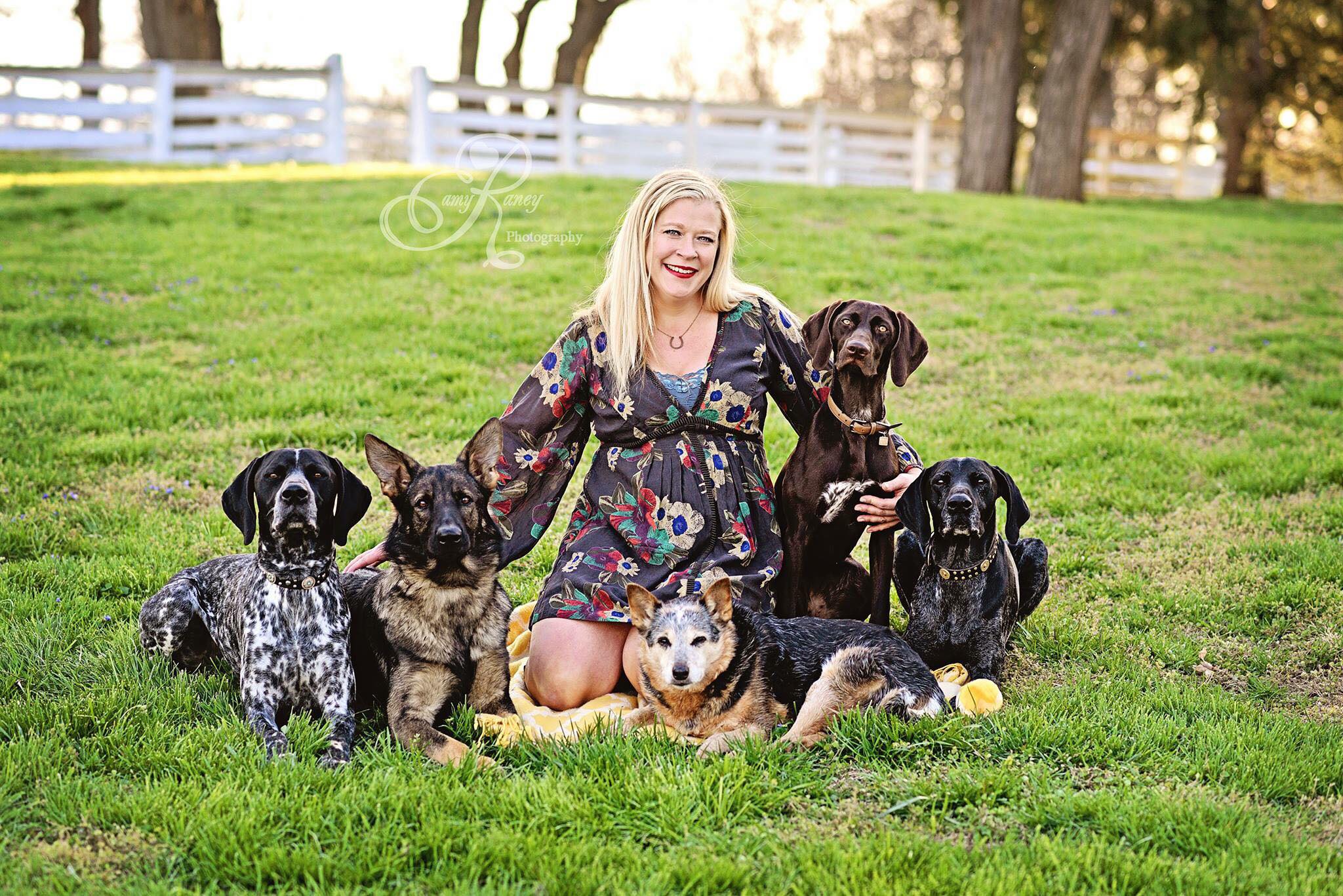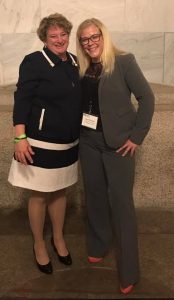644 — Sheila Goffe On the CDC’s Importation Regulations
Sheila Goffe On the CDC’s Importation Regulations
Sheila Goffe, AKC Vice President of Government Relations, joins host Laura Reeves to discuss the CDC’s soon to be implemented rule about importing dogs into the US.
Goffe provides background on retail rescue as the impetus for CDC’s regulations, the work AKC, NAIA and other stake holders have provided to the CDC and the most recent update to the rule.
“CDC put out an announcement saying that they heard the concerns about the rabies certificate,” Goffe said. “Remember they had (originally) required that you had not only a rabies certificate, but a rabies from a USDA or Canadian accredited vet. So it’s not just like your regular vet. It’s like, OK, I have to go find basically the same vet I would go to if I’m importing a dog to another country.
“So that veterinarian-specific requirement, they have dropped that requirement. As of now, they’re saying that all you need to enter the United States with a dog from Canada or another low risk rabies free country is an import form. It’s now available online. You can fill it out online. It takes less than 10 minutes. You’re going to have a picture of your dog on it. You know, a little bit of information about you and an attestation that this dog has not been outside of a rabies free, low risk country for the last six months.
Dogs still need to be at least six months of age to enter the US from any country, Goffe added.
“Blame the irresponsible importers,” Goffe said, “because frankly, they claimed to be us. They claim to be personally owned dogs. And now CDC is saying we can’t tell the difference. So where we need to go with CDC is create a solution where we can say ‘we can tell you the difference, we can show you what we do that those folks would never be able to do. We can show you that this dog has been registered from a registered litter. You know, we can demonstrate this dog was at the vet at two days old getting dewclaws removed. I can prove to you this dog was here in this country and it has not gone to Azerbaijan and come back.”
Goffe encourages exhibitors and breeders to reach out to their representatives to share their concerns. Find resources HERE.
467 – Proposed CA Legislation Radically Regulates All Dog Breeding
415 – Legal Beagles Bring Support to Dog Breeders
Legal Beagles Bring Support to Dog Breeders
The legal beagles at Good Dog join host Laura Reeves to talk about their brand-new legal Resource Center. Ivy League-educated, top Manhattan legal firm attorneys are putting together an entire package of legal services for dog people.
“Dog breeders can and should be empowered with the law,” said Cat Matloub, Good Dog’s Head of Partnerships & Legal Affairs.
“When we started out at Good Dog, we very quickly realized the need for legal support for dog breeders in a few different areas. We identified five key areas where we can provide real valuable legal support and protection to breeders and help them protect their rights, their dogs, their programs and all of that. The five key areas are number one, how to protect breeders’ legal rights and that’s anything from support if there are ever any issues with animal control or breeders being unfairly targeted or their dogs being targeted.
“We do a lot of assisting with stolen photos and content that’s stolen from breeders. That is an enormous area where the public is continually misled and scammed. It’s contributing to the sort of horrible state of affairs that it is out there for a lot of puppy buyers. So we actually are able to get that content taken down on our breeders’ behalf. We have direct lines to the hosting companies of all these websites now and so breeders can come to us anytime.
Defense from scammers
“We help provide protection to our breeders if they’ve been scammed. If they’re worried about being scammed, we provide secure payment systems so that no breeders can ever be scammed.
“We also create things like ongoing rights to a dog, so if it’s breeding rights or rights to not have the dog bred, or co-ownership, how you can protect yourself and make sure that those rights are protected under the law.
Public Education
“With respect to protecting legal rights, we do a lot of educating the public in terms of helping them understand why breeders do things and why they shouldn’t get upset or unfairly attacked.
“Another huge area for us is legislation advocacy and overreaching regulation. What we do is we provide materials in our legal Resource Center. Letters, statements of fact, an advocacy sort of explaining why regulations are harmful, template letters that can be sent to folks that are breeders in the area and they can go speak at the council.
Contract assistance
“The other three big categories (include) contract assistance. There are so many contracts in the dog world. So sample contracts, annotated with explanations, different provisions calling out where state law applies, all of that in our legal Resource Center. What provisions to include, health care and deposit agreements, all that.
“Another big area that we provide support in is mediation services and support. Whether it’s amongst breeders or club members or breeders and puppy buyers, having an objective third party there has been enormously helpful in those situations. And then a general category of legal support more broadly, with questions around regulation and things like that.”
265 – #takebackourstory: How YOU Can Help the Fight
#takebackourstory: how YOU Can Help the Fight for Breeders’ Rights
AKC Vice President of Government Relations Sheila Goffe shares details about the Political Action Committee. This fund, administered by AKC, is another tool helping breeders #takebackourstory.
“We are constantly fighting bad legislation,” Goffe said. “One of the things we can do that is the best short cut is make sure the folks who get elected understand us. The PAC provides campaign contributions to people running for office. Our Board looks at candidates who are already in office, people in position to make a difference. People who have worked with us in the past, we want to be sure they get re-elected.”
The AKC PAC makes contributions through YOU, Goffe said. “This is your dollars, but we work with local clubs to invite local people in specific district to deliver the donation. The enables us to develop relationships in the local community with local legislators.”
The reality of money in politics, Goffe noted, is it’s not a quid pro quo. “But when you hand them a check and they know who’s contributing, it gives you an opportunity to be heard. Then it’s up to us. We are the subject matter experts. Many groups writing breeder laws have no experience breeding dogs. We are the experts.”
#takebackourstory
Regulation vs legislation
AKCGR is currently tracking more than 1500 bills nationwide. One of the hotspots of contention is in Ohio.
“There’s a lot of confusion about what’s going on in Ohio,” Goffe said. “Definitions impacting hobby breeders have not changed. We are working with them directly, with the director of Ohio legislature, to ensure that the correct intent of the laws and regulations are adhered to.”
In a shorthand version of the legislative process, Goffe noted that once a bill passes and becomes law, administrators create regulations that implement the law. The people who are determining how the Ohio law is to be implemented are misinterpreting the regulation.
There are a whole lot of reasons that legislation and definitions matter, Goffe said. Proposed legislation needs to be reviewed because even though it may not impact breeders today, the question remains how easy would it be for it to have impact in the future.
“It may not apply to you until it’s “misinterpreted”… the intent of legislators is one thing, then it goes to how is it implemented. The application of the statute can be a problem,” Goffe said.
It matters. Pay attention. 98% of success is showing up.
https://www.akc.org/clubs-delegates/government-relations/toolbox/
https://www.akc.org/clubs-delegates/government-relations/federations/
225 – Fighting to Preserve our Breeds and their Purposes
Inside the battle to preserve racing Greyhounds
Jennifer Newcome, chair of the committee to support greyhounds, joins me to talk about the fight to preserve Greyhound participation in a sport they love and the current ballot initiative in Florida to ban betting on Greyhound racing.
The proposed legislation is a Constitutional amendment that effectively allows Animal Rights extremists to define what constitutes humane treatment of animals, rather than breeders, owners and exhibitors, Newcome said.
Equating a dog’s purpose-bred job with inhumane conditions, is a “terrifying” concept, Newcome added. It creates a vehicle for banning all activities with animals at the constitutional level.
From the Greyhound Club of America:
About The Greyhound
Purpose
The Greyhound is a sighthound and one of the oldest breeds of dogs. Sighthounds are hunting dogs that pursue running game by sight rather than by scent. This manner of hunting is called “coursing”. The attributes of speed, agility, strength and endurance are necessary to catch and hold game. The feature that distinguishes Greyhounds (and sighthounds) is their ability to run at speeds of 35 miles per hour or more using the double suspension gallop. The Greyhound demonstrates the double suspension gallop in its highest perfection. Their incredible speed comes from the singular combination of skeletal structure, musculature, and the ability to focus completely on the object of the chase.
Greyhounds and other sighthounds course game independently of humans. Sighthounds are unlike other breeds such as herding dogs that take signals from humans when moving sheep from pasture to pen or sporting dog breeds that range out to point and hold birds in one spot until their human indicates it’s time to flush. Once the chase is on and the Greyhound is on its way, there is very little you can do to intervene until the chase is over.
Newcome encourages all Florida residents to vote no on Amendment 13 to protect all of our rights to enjoy the various sports we play with our animals. The American Kennel Club and National Animal Interest Alliance also oppose this legislation.
205 – NAIA’s Sara Chisnell on Legislative Trends
NAIA’s Sara Chisnell on Legislative Trends Nationwide
NAIA Legislative Director Sara Chisnell and PureDogTalk Host Laura Reeves at the NAIA Conference in Washington, DC October 2017.
National Animal Interest Alliance Legislative Director Sara Chisnell is seeing legislative trends develop across the country in several categories. More than just dogs, NAIA is leveraging a larger voice by bringing together groups across the animal kingdom.
Pet shop mandates
Pet shop sourcing mandates are cropping up in a number of states, Chisnell said. Laws were recently passed in California and Maryland which require pet shops to source the animals they sell only from shelters and rescues, cutting off supplies of commercially bred dogs.
“Puppy mill is a genius term coined by the animal rights groups,” Chisnell said. “What was portrayed in past is not true today. No matter how you feel about it, it is a much more regulated source of dogs than any shelter or rescue. There are no regulations whatsoever of shelters and rescues, while there are many layers of regulation on commercial breeders.”
For newer listeners, take a minute to check out PureDogTalk’s interview on this topic from last year.
“Set aside how folks feel about commercial breeders and pet shops,” Chisnell said, “when you cut off this supply, mandating only shelters/rescues supply to pet shops, it opens up those channels further. We have a huge problem with importation of unwanted dogs from other states and other countries. This is bringing in new diseases, Korean dog flu, zoonotic diseases, all kinds of crazy stuff. This is the main reason you should care. This will impact your own dogs.”
Chisnell also noted an increase in behavior issues in rescue animals as a direct result of the “no kill” movement in which rescuers are trying to save all dogs, whether they should be in a home or not.
“Some of the people working in shelters/rescues are very well intentioned,” Chisnell commented. “But many of them may not be properly equipped to evaluate the dogs. There are no repercussions for rescues. Purpose bred animals have consumer protection laws. These no longer come into play when it’s shelter or rescue animals.”
NAIA is working with the pet shop industry on preemptive laws, Chisnell noted. One particular eample, in Michigan, strengthens requirements for pet shops, while simultaneously preempting pet shop sourcing mandates.
Hot car bills
Feel good legislation, like providing immunity for individuals to break into a car to save an animal, have a multitude of unintended consequences that have not been thought through, according to Chisnell.
Animal Research Adoption Bills
These laws require research facilities to place animals in adoption, often through local animal shelters.
“These are programs that research facilities have had for years,” Chisnell noted. “When they are forced to work with local animal shelters, it takes away oversight from people who know the animals.”
For more information on the incredible work done within the research community working with animals, listen to Dr. Cindy Buckmaster’s PureDogTalk interview.
On the plus side…
- NAIA worked with the Illinois Purebred Dog Federation to pass a law requiring more oversight and reporting from shelter and rescues.
- A proposal in New Mexico to charge a pet food fee to a fund state spay/neuter campaign was defeated through NAIA’s efforts.
- NAIA drafted law to require shelters in Virginia to disclose behavior history, particularly known bite history, prior to adoption of a dog.
- In New Hampshire, grass roots advocacy supported by NAIA stopped anti-breeder legislation before it was passed.
For more information about the legislative work NAIA does, click the legislative action center and sign up for alerts at http://www.naiatrust.org/
Remember to stick around for Allison Foley’s Tip of the Week from the Leading Edge Dog Show Academy on safely loading vehicles for travel with our dogs.

